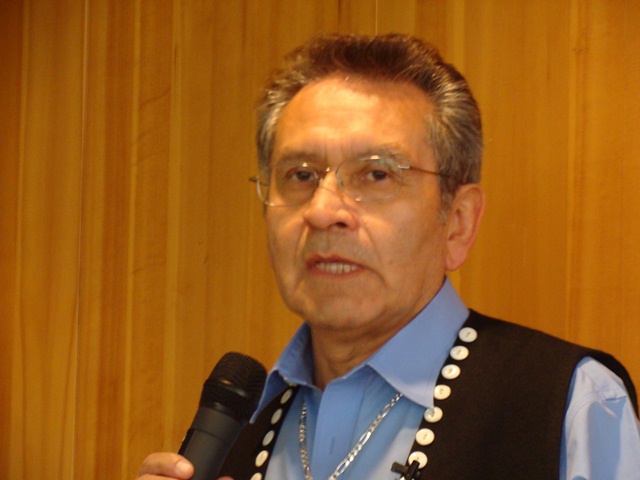Southeast Alaska’s largest tribal organization is pushing for changes in sea-otter management.
Tlingit-Haida Central Council delegates passed an otter resolution at their tribal assembly last week in Juneau.
Sea otter numbers are growing exponentially in Southeast. Council President Ed Thomas says that’s damaging stocks of some key species.
“They seem to be raising havoc around many of our communities. And not just subsistence, but also the divers who go after sea cucumbers and sea urchins,” he says.
Alaska Natives are allowed to hunt otters and give or sell them to other Natives. Proposed legislation would allow whole pelts to be sold to non-Natives.
Thomas says the council wants to do more to slow population growth. But its concerned expanded sales could compete with otter products in the handicraft market.

“We don’t want to export anything that will undermine the local utilization. But where there is a potential for surplus we would like to still get some of those exported in the raw and to set up a system whereby they would be able to bring those back, competing with local artisans,” Thomas says.
He says the council is already trying to work with federal officials on otter management issues.
Council delegates also elected officers at the assembly.
Thomas outpolled former Sealaska CEO Bob Loescher to retain the president’s seat, which he’s held for most of the past 30 years. Loescher was named Citizen of the Year.
Six incumbent vice presidents were also re-elected. Thomas says it’s the first time the full Executive Council has gone unchanged.
Funding prospects are always a major topic at the tribal assembly. Thomas says they’re not looking good.
“It’s really very difficult to get into a growth scenario when we have cutbacks. I think there might be some opportunity in energy programs. But, boy, everything else is under fire,” he says.
Thomas expects federal-funding reductions that could lead to staff and program cuts. He says that would start with administrative spending, but likely move into other areas.
Other news from the tribal assembly:
- Delegates also approved a resolution strongly opposing the exclusion of Alaska Native tribes from the Violence Against Women Act. The federal act is currently going through a re-authorization. The council says the current version of the VAWA (H.R.4154, H.R.4271 and S.1925) discriminates by singling out all Alaska Native tribes with the exception of the Metlakatla Indian Community, and removes the pre-existing authority of Alaska Native tribes to issue civil protective orders.
- Delegates re-elected 1st Vice President William Micklin of San Francisco, 2nd Vice President Robert Sanderson Jr. of Ketchikan, 3rd Vice President Yodean Armour of Klawock, 4th Vice President Richard Peterson of Kasaan, 5th Vice President Harold Houston of Juneau, and 6th Vice President Lowell Halverson of Seattle.
- Ed Thomas presented Mary Elizabeth Jones with the President’s Lifetime Achievement Award for her many contributions towards improving healthcare services for Tlingit and Haida people and strengthening Alaska Native women’s political positions within their communities.
- The Doloresa Cadiente-Hardin Tribal Justice Award was presented to its first two recipients: Tribal Child Support Unit Attorney Jessie Archibald and Alaska Legal Services Corporation Attorney Holly Handler.
